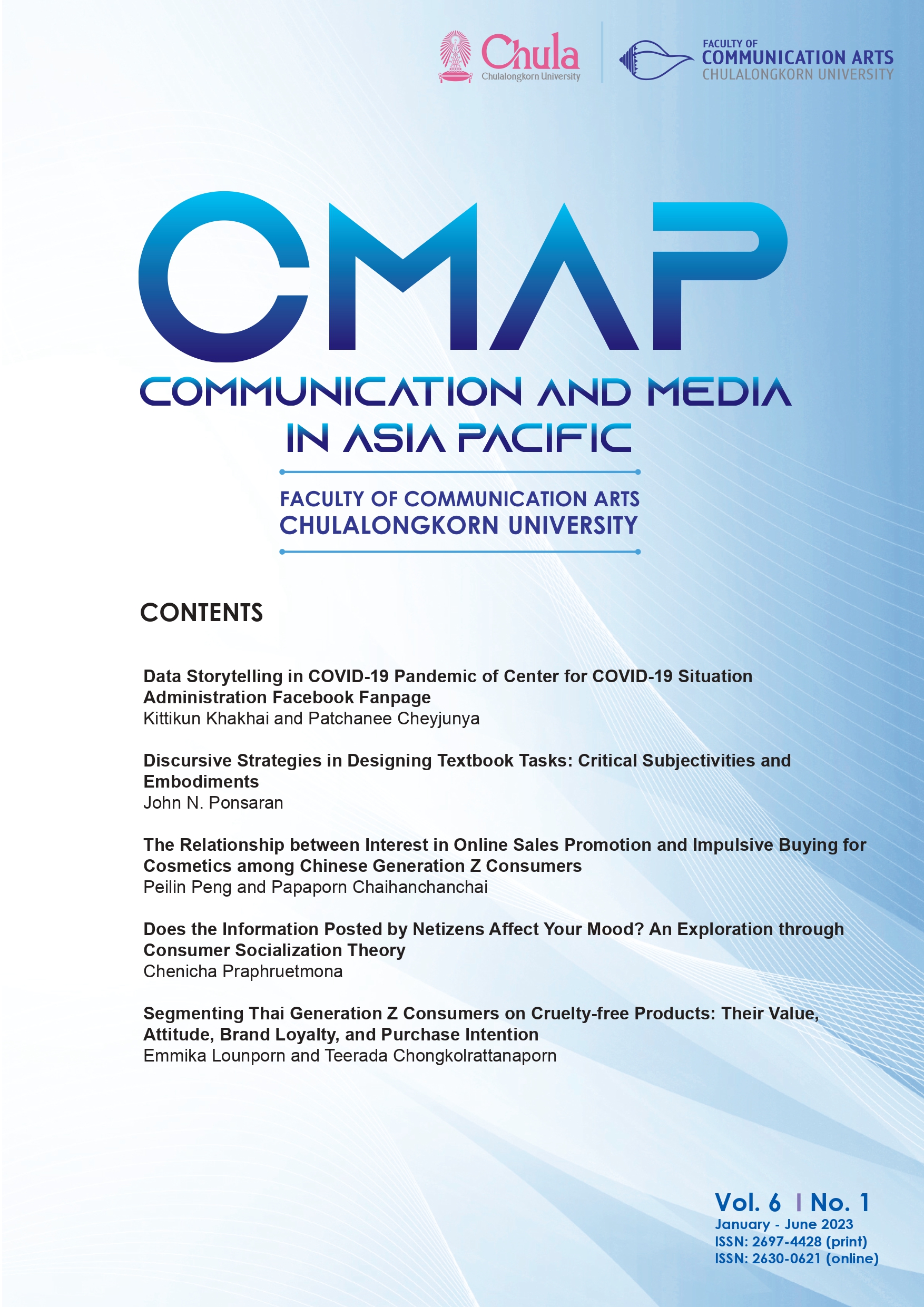Does the Information Posted by Netizens Affect Your Mood? An Exploration through Consumer Socialization Theory
Main Article Content
Abstract
Online shopping is a new digital shopping subject to the combination of information society and anticipated emotion. In this study, consumer socialization theory (CST) is adopted to examine the influence of consumers’ sharing of online shopping characteristics on social media (i.e., informational social influences, positive anticipated emotion, negative anticipated emotion and content sharing behavior) on the process of consumer socialization and social behavior, to determine the impact of these characteristics on digital content sharing behavior. One moderator, product attitude, was tested in the study. Data from 291 online shopping users was collected using an online survey in Thailand. The structural equation modeling (SEM) results indicated that informational social influences have positive effects on positive anticipated emotion and facilitate consumer content sharing behavior on social commerce. Product attitude had a partially moderating effect on the model. The findings provide a clearer understanding of the attitudes and behavior of social user individuals related to the use of social commerce. This should help researchers and managers develop better marketing and management strategies in the future.
Article Details
References
Artanti, Y. (2020). Online content sharing behavior: A review on the social psychology perspective. In Proceedings of the 2nd International Research Conference on Economics and Business (Vol. 1), 297-305.
Dolan, R., Conduit, J., Frethey-Bentham, C., Fahy, J., & Goodman, S. (2019). Social media engagement behavior: A framework for engaging customers through social media content. European Journal of Marketing, 53(10), 2213-2243.
Hu, X., Chen, X., & Davison, R. M. (2019). Social support, source credibility, social influence, and impulsive purchase behavior in social commerce. International Journal of Electronic Commerce, 23(3), 297-327.
Jiang, G., Liu, F., Liu, W., Liu, S., Chen, Y., & Xu, D. (2021). Effects of information quality on information adoption on social media review platforms: Moderating role of perceived risk. Data Science and Management, 1(1), 13-22.
Lauriano, L. A., & Coacci, T. (2021). Losing control: The uncertain management of concealable stigmas when work and social media collide. Academy of Management Journal, 65(2), 1-55.
Lin, H.-F. (2015). The impact of company-dependent and company-independent information sources on organizational attractiveness perceptions. Journal of Management Development, 34(8), 941-959.
Milfeld, T., & Flint, D. J. (2020). When brands take a stand: The nature of consumers’ polarized reactions to social narrative videos. Journal of Product & Brand Management, 30(4), 532-548.
Nafees, L., Cook, C. M., Nikolov, A. N., & Stoddard, J. E. (2021). Can social media influencer (SMI) power influence consumer brand attitudes? The mediating role of perceived SMI credibility. Digital Business, 1(2), 1-10.
Osei-Frimpong, K. (2019). Understanding consumer motivations in online social brand engagement participation: Implications for retailers. International Journal of Retail & Distribution Management, 47(5), 511-529.
Saha, M., & Sahney, S. (2021). Exploring the relationships between socialization agents, social media communication, online shopping experience, and pre-purchase search: A moderated model. Internet Research, 32(2), 536-567.
Shen, X., Cheung, C., Lee, M., & Chen, H. (2011). How social influence affects we-intention to use instant messaging: The moderating effect of usage experience. Information Systems Frontiers, 13(2),157-169.
Shim, S. (1996). Adolescent consumer decision‐making styles: The consumer socialization perspective. Psychology & Marketing, 13(6), 547-569.
Siahtiri, V., O'Cass, A., & Nabi, N. (2022). Unlocking consumer consideration set size formation for luxury services: A study of self-identification, brand status and anticipated emotions. International Journal of Consumer Studies, 46(6), 2488-2502.
Simamora, B. (2018). Achievement as gift and prestige: Formulating anticipated emotion of others as new determinant of consumer motivation. ASEAN Marketing Journal, 8(1), 29-53.
Sultan, A. J. (2021). Fear of missing out and self-disclosure on social media: The paradox of tie strength and social media addiction among young users. Young Consumers, 22(4), 555-577.


